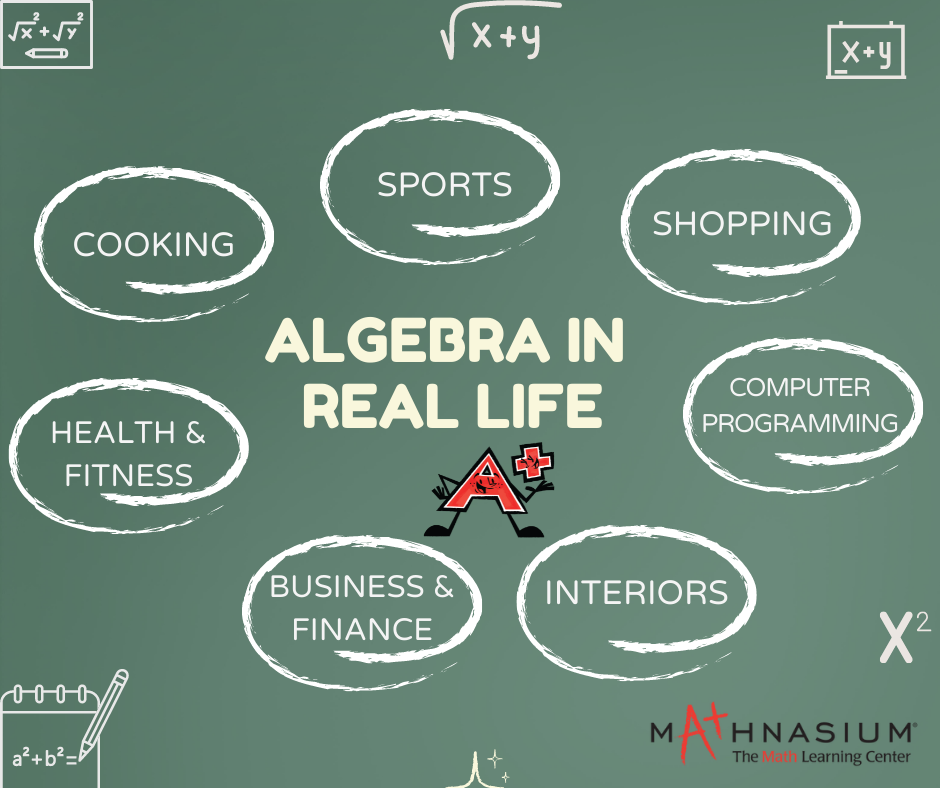The word “Algebra” comes from the Arabic word “al jabr,” which translates to “reunion of broken parts.” Muhammad ibn Musa al-Khwarizmi, a 9th-century Persian mathematician, geographer, and astronomer, is regarded as “the father of algebra.”
There may be times when you wonder how some mathematical calculations relate to your life. Algebra is a good example; students wonder if it will ever be applied in the real world. The truth is we use algebra quite frequently in our everyday lives, and without even realizing it! We not only use algebra, we actually need algebra, to solve most of our problems that involve calculations.
In this blog, we will grasp instances in real life where applications of algebra are needed and examples of applications of algebra in real life.
Examples of using algebra in everyday life
Here are some simple examples that demonstrate the relevance of algebra in the real world.
Cooking or doubling or halving the recipe: The kitchen is one of the places where Algebra is used in an interesting way. Especially, when you are making items like cake, vegetable soups, etc, where the correct combination of the ingredients is very crucial, Algebra comes to your rescue and helps you find the correct quantity of ingredients to make the food sufficient for different sizes of servings.
Variables are the quantities of ingredients and the number of servings. By using Algebraic intelligence, the cook ensures that not only is the food available enough but also that it tastes great. Cooking is so Algebraic!
Doing Interiors and Landscape designing: Algebra is used not only in interior planning or in landscape design, but throughout the whole Architecture program. The designers use data such as measurements of the space and the size of the items to locate the correct elevation or to determine the collection of items to be used in space.
Computer Programming: While coding, the programmer is making use of datasets, strings, and variables. They assign conditions in the use of these strings and establish relationships, which ultimately result in an action on the front end. This activity of coding, assigning values, and pre-defining the functions is actually you applying the knowledge of Algebra that helps you create the codes that work amazingly and help you meet your coding objectives.
Computer programming is done mostly in terms of data sets and variables. The conditions become the variable and the front end result is the outcome. Establishing a relationship between the two is Algebra happening in your mind.
Business & Finance Management: Business is as dependent on algebra as any other field. In order to calculate profits and losses, business owners use algebraic operations. A business person will use algebra to determine whether a piece of equipment does not lose its worth if it is in stock. In addition, the business owner needs to calculate the lowest price at which an item can be sold while still covering expenses. In the finance industry, exchange rates and interest rates are often represented algebraically; therefore, to carry out finances accurately, it is necessary to be familiar with algebraic operations.
Sports: Sports aren't forgotten when it comes to using algebra. Almost all athletes unintentionally use algebra. Cricketers can smash sixes because they can calculate the force needed to hit the ball, and basketball players can calculate the trajectory needed to get a point. Footballers calculate the force and distance required to score a goal in a similar way, and sprinters estimate the speed required to traverse the distance to reach the endpoint; thus, algebra is involved in every sport in some way.
Finding the tax liability: People work to earn money as they grow older. They might need to figure out how much money they owe in taxes. Calculations such as determining the tax rebate cap and proportioning profits to determine how the income should be shared among various investment possibilities are part of the process. This method of determining tax liability is based on doing algebraic calculations with variables such as income, rebate eligibility, and so on. Employees can use algebra to structure their income and expenses and calculate their taxable compensation.
Astrological calculations: Astrologers use orbital motions to forecast various occurrences. They try to figure out what the relationship is between the planet's rotation speed and its position after a set amount of time, and so on. All of these calculations are Algebra, and when these predictions are produced, the concept of linear or quadratic equation balance comes into play. The Father of Algebra, who was described in the earlier half of this section, did use Algebra to contribute to several astronomical and astrological discoveries throughout his time.
Among the many everyday actions that use algebra, these are just a few examples. We are sure you can think of many more.
Algebra is like a universally useful tool or a sorcery wand that can help manage everyday problems. Whenever you are faced with a math problem, for instance when you have to solve an equation or work out a geometrical problem, algebra is usually the best option.



 (877) 968-6284 Ext. 12
(877) 968-6284 Ext. 12







